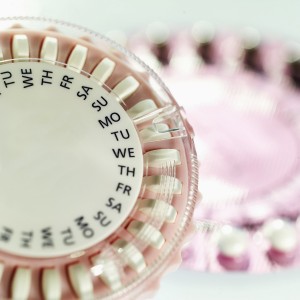Hormonal contraception is one of the most common, popular and proved methods of protection. But how reliable are birth control pills in terms of unwanted pregnancy for health and safety?
Why use birth control pills?
Birth control pills have a number of advantages over other forms of protection from unwanted pregnancy, especially in front of barrier contraception (condoms):
- reliable and high-quality method of contraception with efficiency up to 100%;
- no age limit;
- reduce pain during menstruation;
- improvement in skin condition.

How to choose contraceptive pills?
There are two main types of birth control pills:
- combined oral contraceptives (monophasic, biphasic, triphasic) which contain two types of female hormones – estrogen and progesterone;
- contraceptives which contain only progesterone (mini-pills).
Only a doctor can prescribe birth control pills on the basis of patient’s examination and collected medical history, including family. Presence of diseases, bad habits, physiology and lifestyle specifics – all these matters.
Only after receiving detailed information about a patient, the gynecologist can prescribe exactly the kind of oral contraception that will suit her.
For prescribing birth control pills it is necessary:
- to conduct a gynecological examination with smear;
- to take biochemical blood assay;
- to take pelvic ultrasound;
- to consult mammologist (ultrasound of breast);
- to conduct skin examination;
- to know constitutional and physiological features of the patient.
Which birth control pills are better?
One cannot say which the pills are better. There are those that fit a particular patient, and those that are categorically contraindicated to her. Based on constitutional-biological features, there distinguish 3 female phenotypes, for each of which different COCs (combined oral contraceptives) are indicated:
- estrogen type is recommended medium- and high-dosage oral contraceptives (with enhanced progestin component);
- balanced type is indicated second-generation drugs;
- progesterone type is recommended birth control pills with an anti-androgenic component.
Risks of taking contraceptives
Unfortunately, along with positive effect, COCs may cause a threat to health in case of improper appointment or usage. Side effects such as headaches, nausea, lack of appetite and libido, urticaria, etc. can be extremely unpleasant, but they are not a serious danger to the body. Another thing – diseases that can develop as a result of contraceptive pills reception.
Most often diseases appear due to long-term use of oral contraceptives, but, more often due to changes in ovarian function by suppressing ovulation.
While everything is interconnected in the body (hormones produced by the body, ovaries and higher hormonal centers (hypothalamus and pituitary gland)), even small doses of hormones from outside can disrupt balance and undermine woman’s health.
Among consequences of receiving COCs there are:
- vascular thrombosis;
- skin diseases;
- vitamin deficiency or hypovitaminosis;
- violation of folic acid absorption, essential for normal conception and pregnancy development;
- osteoporosis;
- oncology;
- multiple sclerosis;
- hair loss.
In some cases, pills may result in fertility delay that is caused by organism adaptation to hormone obtained from outside. If the body ceases to produce their own hormones, infertility can occur. And, of course, oral contraception does not protect against sexually transmitted diseases.
Pills taken after sexual intercourse
One hundred percent protection against pregnancy comes with receiving the second package of hormonal contraceptives, so when using the first pack, do not neglect additional contraception (condoms).
How to take birth control pills?
Contraceptive pill administration has a strict regimen, which should be clearly observed. Most often it is «21/7» regimen when pills are taken for 21 days, then there is a 7 days break. Because each case is different, the question of how to take pills you need to discuss with your gynecologist (who prescribes individual medication reception scheme).
There is also the so-called emergency contraception – extempore. In this case, immediate pill reception (no later than 72 hours after unprotected sexual intercourse) may protect against unwanted pregnancy.
Impact on weight
Is it possible to gain weight taking birth control pills? This question disturbs many girls. There is no unequivocal answer, and experts’ opinions differ. There is a hypothesis that women who took oral contraceptives, on psychological background simply consume more food than before starting taking pills.
What will happen if combine birth control pills and alcohol?
Birth control pills and alcohol will reduce an effect of the medicine. But these drugs are one of the most popular means to prevent unwanted pregnancy and hormonal background recovery after previous gynecological diseases or surgery.

Taking contraceptives should be on regular basis, so sooner or later a question arises: «Is it possible to combine pills with alcohol?» To figure it out, you need to become more familiar with the process of COCs (combined oral contraceptives) and ethyl alcohol interaction.
Alcohol and COCs Interaction
As an example, we will take «Yaz» COCs that operate in three areas:
- suppress ovulation;
- help to thicken cervical mucus, which hinders sperm penetration;
- affects endometrium, making it more thin and smooth, which prevents fertilized egg sticking to the uterus.
The drug must be taken continuously. The package contains 28 pills, 21 of which have a contraceptive effect and seven others – the so-called «placebo» have no contraceptive effect. During their reception, hormonal changes appear, and there are menstruation-like hemorrhages. After the package is over and all 28 pills are taken, you can begin to receive pills from new Yaz blister.
There are other popular means of contraception in pills. They have the same effect on the body as Yaz, but dosage regimen is somewhat different. These pills should be taken for 21 days followed by a seven days break. At this time, there should appear menstruation-like hemorrhages. On the eighth day, you should start using pills from a new package.
Instructions on how to receive contraceptives usually do not indicate their interaction with alcohol. For this reason, many women believe that alcohol is allowed to take when taking contraceptives, but it is not.
Birth control pills, including Yaz and similar drugs, are hormones. During their reception, hormones get into the body and begin to exert some effect on reproductive system functioning.
When alcohol gets into the body, it begins to be processed by the liver. At this, this bodywork is accelerating, as liver wants to bring alcohol out of the body as soon as possible. This reaction can adversely affect hormones absorption, reducing their effectiveness.
Thus, COCs effect may be incomplete and lead to unplanned pregnancy. This is evidenced by reviews of women who while taking contraceptive pills allowed themselves to drink strong drinks.
It should be noted that large amounts of alcohol can lower hormonal agents concentration in the body, but allowable daily dose will not hurt and affect COCs action. Experts estimate that permissible ethanol safe dose is 20 mg. Such amount of alcohol is contained in one glass of wine, 100 mg of whiskey and a bottle of beer. Exceeding this norm can reduce contraceptives effectiveness and harm the body.
Even if alcohol dose was minimal, between it and of hormonal pill reception there should be at least three hours. During this time, ethanol will have time to be metabolized by the body and its concentration in blood will be minimal.
More dangerous is the fact that large amounts of alcohol can cause intoxication and vomiting. If a pill was taken not long before this, it is possible that it had not the time to be completely absorbed by the digestive tract and left the body during vomiting attack. If this happens, you need to look into instruction for use to the drug, it should be specified how to behave in a similar situation (you may need to take another pill or postpone COCs till health condition improvement). During the following days, until your cycle ends and you start taking pills from the next package, you should use additional means of contraception (e. g., condoms).
Withdrawal of contraceptive pills
 If to talk about how hormonal contraceptives work, in short words the following things happen:
If to talk about how hormonal contraceptives work, in short words the following things happen:
- ovulation suppression (egg maturation and release);
- changes in the endometrium, preventing egg implantation;
- cervical mucus thickening (making it impenetrable for sperm).
After complete contraceptive pills withdrawal, normal functioning of the reproductive system is quickly restored. Hormonal contraceptives admission before conception has no adverse effects on fetus, course, and outcome of pregnancy.
Accidental drug administration during early pregnancy is not dangerous and does not serve as the basis for its interruption. But at first suspicion of pregnancy contraceptive pills should be discontinued.



